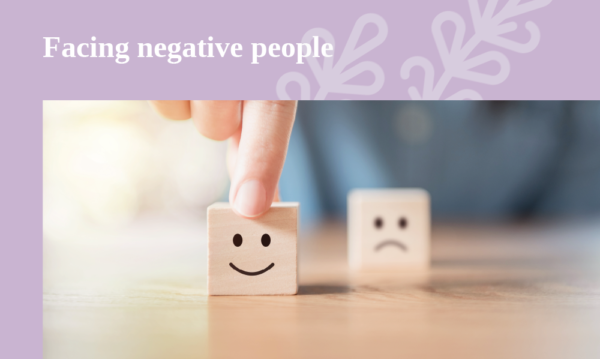We have all been in contact with or associated with “negative” people. Most of us have been hurt or felt bad because of this relationship.
When can a person be described as “negative”?
We could describe a person as “negative” when he is unhappy, pessimistic, and tends to see the negative side of life and everything is happening. There are two types of negative people:
In the first category, we could include people who criticize, complain, and blame other people for the problems they face and their misery. They may reject others, become aggressive, and oppose any discussion regardless of their actual beliefs and convictions.
The second category includes people who tend to blame and reject themselves, undermine their health and happiness, be pessimistic, feel weak and unable to change situations, and identify problems and risks in every incident that occurs to them.
Many times, there can be a combination of the above two categories.
What can we do when there is such a person in our immediate environment (family, work, community) or if we are negative?
It is essential to try to understand why this person is negative. We are usually characterized by negativity when we feel disadvantaged and insecure, when we lack self-esteem, self-confidence, and acceptance, or feel unable to deal with the world and its problems.
• Many of us have been hurt in the past, during our childhood, adolescence, or adulthood. Such cases have caused intense pain, rejection, injustice, anger, and frustration resulting in a decrease in our confidence in people, life, ourselves, and our ability to be happy and successful.
• We may be afraid; we are afraid of getting hurt; we are afraid of rejection, ridicule, and frustration that may prevent us from opening and showing confidence in others. A person with the fear of rejection or wound can either close in on himself and walk away or attack others in advance.
Maybe the other person’s behavior reflects our behavior. The world around us is a mirror that reflects our own old and current beliefs, thoughts, words, feelings, behaviors, expectations, phobias, desires, and actions.
If we do not love and accept ourselves for what we are, we will attract others’ rejection. If we consider that no human being is trustworthy, we may draw this aspect of his character. If we believe that people, in general, are harmful and that everyone wants to take advantage of us and do not care about us at all and our feelings or do not love us, then we are likely to attract this from the people around us.
Then, we see that our aggression can cause theirs; our fear can exacerbate theirs; our anger can provoke theirs. Respectively, however, our composure can calm them down; our love can free them from their negativity and free us from our own.
What can we do?
• First, we need to realize that we are all constantly evolving. In this way, we will be able to show understanding and become more patient. No one is perfect, so we cannot expect ideal behavior from someone who is not perfect.
• A good way to help others change is if we change. When we free ourselves from our negativity, weakness, and pessimism, we will help the other be liberated.
• Many times, just believing that the other can change, helps him to change. If we think he cannot, he will not change the way he treats life.
• It is good to look at why this person exists in our lives. We have something to learn or change ourselves in our behavior through it.
• We need to learn to be happy regardless of each person’s behavior, which means that our self-worth and security remain intact, no matter what the other person does.
• An important step would be to forgive and love the other for exactly what they are, while setting certain boundaries in their behavior, in a way that respects both ourselves and the other.
• It is necessary to learn to face the other with confidence, without aggression but not with fear.
• Remember that the more we love and accept ourselves and others, the less influence the other has on us.
• It is vital to realize that we are not the target of the other. He does not need to hurt us; he wants to release the negativity he has or confirm himself. He does not want us to suffer necessarily.
• No one is responsible for our reality, but neither are we responsible for the others’ reality.
• It is good to distinguish the person from his behavior or actions. We can accept to love someone, even when we do not accept the way he behaves.
• We can apply effective communication, in which we express what we need from the other and hear what he needs from us.
References:
Najemy, R. (1996). Us and our relationships


